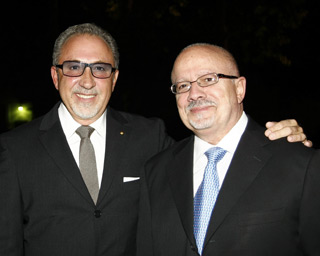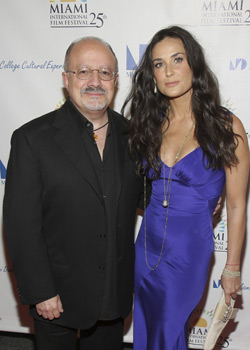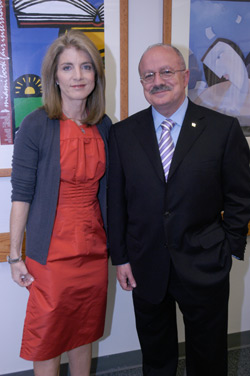Visionary Leadership
Dr. Eduardo Padron Propels Miami’s Renaissance


SocialMiami had the opportunity to speak with Dr. Eduardo Padron, president of Miami Dade College, the largest institution of higher education in America with more than 170,000 students. Having garnered accolades too numerous to mention, Dr. Padron is a major force in the City of Miami, especially with arts related initiatives. His foresight is a primary contributing factor to Miami’s cultural renaissance and his insight into our great city is a fascinating account.
With the recent explosion of arts and culture throughout the city and the development of downtown, one might say that Miami is in the midst of a cultural renaissance. Can you please tell us about this renaissance from your point of view and how the seeds that were planted 30 years ago with NFAA, the book fair, the Miami City Ballet and the New World Symphony have blossomed in a manner that is redefining Miami?
Miami has really grown to become one of the great cities of the hemisphere and the world. As a great city, Miami has strong arts and cultural institutions. Art is critical to reflecting and expressing the range of cultures that make Miami unique. Part of the reason for this is that the arts transcend all differences and boundaries. The Miami Book Fair International, for example, is just one way Miami Dade College creates a sense of community among many cultures, while highlighting the importance of the literary arts and arts education. The college’s Miami International Film Festival has the same effect among other cultural gems Miami Dade offers.
The Miami International Film Festival has been going through transitions in leadership, what is the current objective of the festival and how should a film festival in Miami differentiate itself from festivals in other cities?
Miami International Film Festival remains the only major film festival hosted by an institution of higher education. As such, the festival must give students and our community ample opportunities to learn and experience the world around us through different lenses. The diversity of screenings has led some to call Miami International Film Festival ‘The Cannes of the Americas.’ I think the festival’s uniqueness, in part, stems from its strong focus on Ibero-American film.
In addition to supporting learning and the arts, Miami International Film Festival also contributes greatly to industry growth in the region and to fostering the future talent and leaders in the industry through the many seminars and workshops with students and aspiring filmmakers that the Festival offers.

You’ve recently been appointed by YoungArts to their Board of Trustees. Can you please explain the importance of arts education for children?
The arts are essential to creating well-rounded adults. The arts allow students to see in different ways, to embrace differences in people and cultures, and to access a special form of knowledge within themselves. It is just as important for students to acquire knowledge via the arts as through math, science and English.
You’ve also recently been selected by President Barack Obama to chair a new White House Initiative on Educational Excellence for Hispanic Americans. What does this initiative entail and what educational challenges do Hispanic children face, especially those from lower income homes?
As the chair of this initiative, I will guide a commission comprised of 30 members, including academics, business leaders and philanthropists. We are tasked with the responsibility of providing guidance to the Administration on education issues related to Hispanics, to addressing academic excellence and opportunities in the Hispanic community and to increasing educational attainment for Hispanic children and youths, while closing the achievement gap between Hispanic students and their non-Hispanic peers.
The challenges are immense. Hispanics are graduating from high school at much lower rates than white non-Hispanics and African Americans, and are achieving higher education success at lower rates. The challenge of poverty is always daunting as well. The commission will work to ensure that the necessary supports are in place to help Hispanic students and others realize their tremendous potential.
Miami Dade College is not only a major aspect of Miami’s educational community, but also one of the city’s largest employers. How has Miami Dade College grown under your leadership?

Miami Dade College has grown to become the largest institution of higher education in the country. We have eight campuses and more than 170,000 students from around the world. Our educational offerings reflect the diverse community we serve. The College currently offers more than 300 programs of study and numerous degree options from associate and baccalaureate degrees to career training certificates. We also have a wide variety of non-credit Community Education classes that extend learning opportunities to all age groups. The Virtual College supports our growing population of online learners. There’s also The Honors College, the New World School of the Arts and other exemplary programs. In short, we are continuously developing new programs that will help prepare South Floridians for new knowledge economy. On a national level, we have implemented a model set of learning outcomes that allows us to more effectively assess our students’ success and maintain accountability. These outcomes are designed not only to promote life-long learning, but also to foster active citizenship. The strides this institution has made are a result of collaboration between the faculty, administration and students.
On the social front, when you have an important lunch meeting, what restaurants do you like?
It depends on the day of the week, but I enjoy Zucchero and Dolores, But You Can Call me Lolita.
In conclusion, can you please tell us why Miami is special to you personally?
Miami is the city that embraced me. When I arrived here at 15, I was adrift; but I found my own strength with the support of people who cared. Miami High and MDC truly changed my life. I worked on my doctorate at the University of Florida, but ultimately returned here because Miami had become my home.

Aaron Glickman is a creator/producer native to Miami. He has worked in South Florida media for the past 15 years documenting a regional transformation predicated on art and design. His digital media platform, www.Current.Miami, tells hyper-local stories through the use of video.
From 2007 to 2016, Aaron was the publisher of SocialMiami.com, a society-driven digital media platform. During that period, Aaron created content-driven strategies with many of the region’s most prestigious brands and institutions. He also served on boards and committees for several non-profits.
In 2017, Aaron produced and directed the feature-length documentary Miami Basel: Art’s Winter Playground. The film tells the story of Art Basel’s influence on Miami. Its world premiere in 2019 at the Miami Film Festival.
Prior to working in media, Aaron was a union stage actor. He studied Shakespeare in London and was a six-year member of Theatricum Botanicum, a classical theater company located in Topanga Canyon, California. In 2016, Aaron returned to the stage to tackle the role of Richard Sherman in “The Seven Year Itch” and is currently doing voice-over work for NBC.


